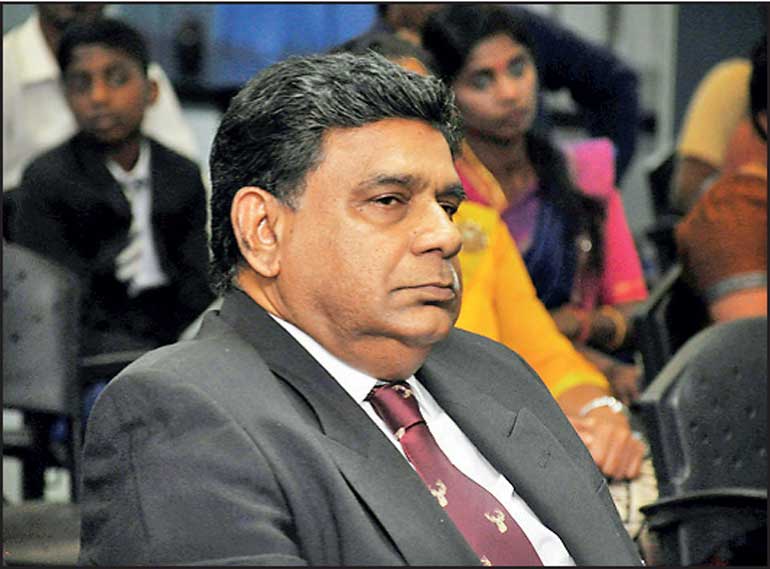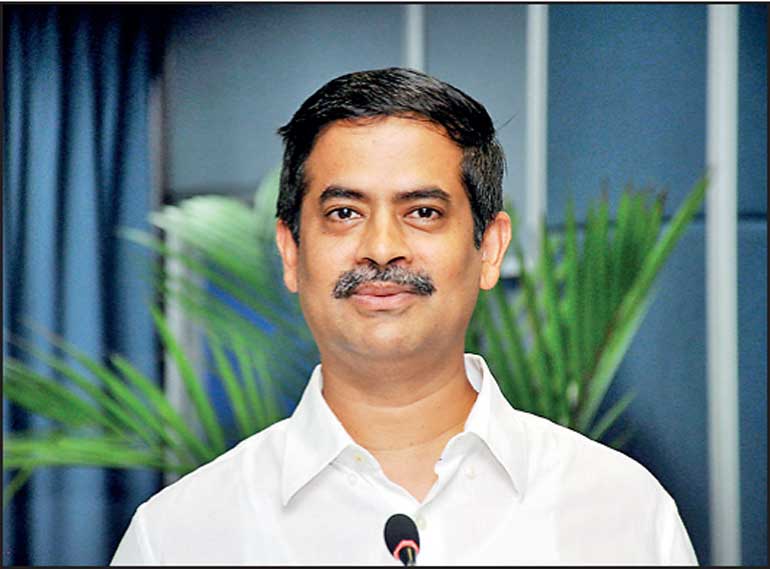Sunday Mar 01, 2026
Sunday Mar 01, 2026
Wednesday, 13 December 2023 00:25 - - {{hitsCtrl.values.hits}}


Disaster Management Centre Director General Maj. Gen. Sudantha Ranasinghe

IWMI Research Group Leader Giriraj Amarnath
By Divya Thotawatte
Celebrating International Disaster Risk Reduction Day, the International Water Management Institute (IWMI), recently hosted an event where experts spoke about the importance of battling inequality within the country for more community awareness and effective disaster management.
The event was themed ‘Fighting inequality for a resilient future’ and was organised by the IWMI in collaboration with the Disaster Management Centre, World Vision Lanka and the Red Cross. Researchers, experts and students from selected schools in the north-eastern province of Sri Lanka were present to celebrate the day and discuss preparation for natural disasters.
The event also honoured winners of inter-school art and essay competitions organised by the IWMI involving five schools in the Nuwara Eliya district. The participants’ work, themed on climate change and disaster risk reduction were displayed at the event. K. Madusha and N. Yalini from Maria Tamil Maha Vidyalayam, winners of the essay and art competitions respectively, were awarded for their work.
The winners were invited to speak to the audience and they discussed the adverse impacts of natural disasters, explaining the need for better technologies, more resources and professional assistance to mitigate the impacts. The experts pointed out the necessity of including the insights and ideas of community members in managing natural disasters, while resisting inequalities within society and the communities that are affected.
Chief Guest and Disaster Management Centre Director General, Maj. Gen. Sudantha Ranasinghe said, “The present trend of rain started on 26 September. To date, 18 districts and 32,000 families have been affected, and 10 deaths occurred. At present, 49 safety centres are in operation housing 115,000 people. Including compensation, the Government has so far spent Rs. 28.3 million.”
He said the above data highlighted the importance of community awareness and disaster risk reduction. Children were the primary factor in a resilient future since they are agents of change. Therefore, focus on their education and awareness on the subject was crucial, Ranasinghe added.
Speaking at the event, World Vision Lanka International Resource Development Management Director, Stanlake Kaziboni said, “We have realised that the most vulnerable people in society are disproportionately affected by disasters than other people. Poverty and discrimination are the causes and consequences of disaster. Inequalities create the conditions that render people vulnerable to disasters.”
He said reducing vulnerability to disasters required greater investments for the collection and use of data on disproportionate exposure to disasters and resilience building. Creating an accommodating environment for locally-led adaptations by devolving decision-making to the lowest appropriate levels, not merely focusing on Colombo, but centring decision-making on villages, addressing structural inequalities faced by women, youth, children, people with disabilities, and those who are displaced and marginalised were all vital. “Let’s make decisions that are inclusive of all those who are vulnerable,” he added.
IWMI Research Group Leader Giriraj Amarnath explained that inequality lied in access to information, resources, timely action and knowledge which could only be addressed with early warning, early action and finance. Thus addressing inequality, the IWMI has created AWARE, a platform for community awareness and assisting community members to better prepare for natural disasters.
Furthermore, the organisation’s current water risk resilience program also focuses on managing floods and droughts. This is to promote a water secure world in consideration of aspects such as, water availability, water scarcity issues, accessibility of water, storage of water for energy, etc.
“We started this program in Colombo because it is better to be prepared than being reactive. Under this program we look at things like how to recover from major disasters with a focus on science and technology policies and advocacy,” he said.
The IWMI is an international, research-for-development organisation, with offices in 15 countries and a global network of scientists operating in more than 55 countries. World Vision Lanka is a relief, development and advocacy organisation dedicated to working with children, families and communities to overcome poverty and injustice.
Pix by Lasantha Kumara